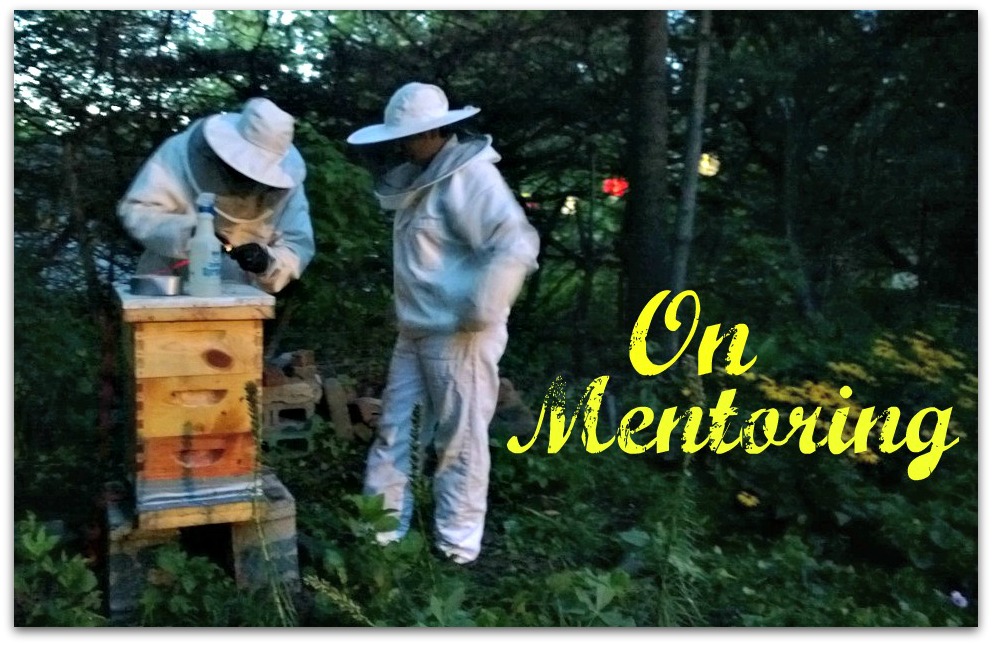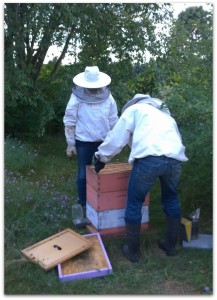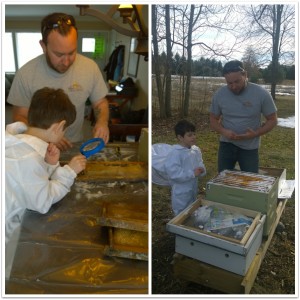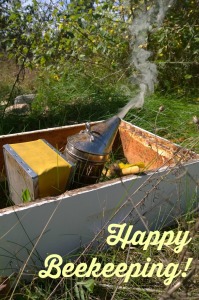 Recently I attended the bee school planning meeting. As we wove on and off task (as meetings tend to do), the topic of mentors came up. The members in the room represented a variety of age- and experience-levels, but we all agreed that finding a good mentor is crucial to beekeeping success.
Recently I attended the bee school planning meeting. As we wove on and off task (as meetings tend to do), the topic of mentors came up. The members in the room represented a variety of age- and experience-levels, but we all agreed that finding a good mentor is crucial to beekeeping success.
We wondered why it’s been so difficult to start a mentor group. Is it because newer beekeepers (keepers for 3-5 years-ish) are afraid to offer advice? Is it because new beekeepers are afraid to ask? Is there a perception that mentoring is time-consuming?
 I was mulling our discussion. I’m a high school teacher and, at lunch, several of us were imparting unsolicited advice upon one of the new teachers (she was pretending to appreciate it), when it occurred to me that so many jobs are similar to beekeeping. The thing about teaching is that it is ever-changing because your student make-up is ever-changing. What works in one class may not work in the next. A lesson plan that dazzled the kids last year may fall flat this year. A seemingly normal day may be thrown into chaos because of a fire drill, a two-hour delay, or an assembly. I teach differently to and expect different outcomes from freshman as I do seniors. So to provide someone with teaching advice is really difficult. What I can do, however, is provide generlized encouragement, I can offer up past experiences, and I can help new teachers find the answers when I don’t know them.
I was mulling our discussion. I’m a high school teacher and, at lunch, several of us were imparting unsolicited advice upon one of the new teachers (she was pretending to appreciate it), when it occurred to me that so many jobs are similar to beekeeping. The thing about teaching is that it is ever-changing because your student make-up is ever-changing. What works in one class may not work in the next. A lesson plan that dazzled the kids last year may fall flat this year. A seemingly normal day may be thrown into chaos because of a fire drill, a two-hour delay, or an assembly. I teach differently to and expect different outcomes from freshman as I do seniors. So to provide someone with teaching advice is really difficult. What I can do, however, is provide generlized encouragement, I can offer up past experiences, and I can help new teachers find the answers when I don’t know them.
You can also do these things as a beekeeper.
The weather changes from year-to-year. The personality of one hive may vary dramatically from that of another. Sometimes hives swarm. Sometimes they don’t. Some bees follow all of the “rules of being a honeybee” whereas, others were clearly absent on the day directions were handed out. Some years you’ll buy packages, some years you’ll start with nucs. Sometimes queens die. Sometimes you accidentally step on your queen (oops). You’ll never have two hives the same and you’ll never have two years that are the same. At the very least, sometimes the best part of having a mentor is so that you can say to someone, “Crap! I killed the queen!” and another exasperated friend can say, “Oh my gosh, I did that once too!”
Mentors do not have to have all the answers. Or any answers, for that matter. Sometimes a mentor is just a sounding board. Sometimes a mentor is an extra set of hands.
Whether you have one year of experience or 30, you have ideas to offer. One reason I’m happy that my husband and I  have taken on beekeeping as a pair is because I have someone I can bounce ideas off of whenever I want. He and I both do a lot of reading about bees in our spare time, but we tend to read different things. He loves to read and watch YouTube videos about management. I love to read and watch TED Talks about biology and the environment. Neither of us is the “most experienced beekeeper”, but we still have some great conversations (and debates) about the state of the hives.
have taken on beekeeping as a pair is because I have someone I can bounce ideas off of whenever I want. He and I both do a lot of reading about bees in our spare time, but we tend to read different things. He loves to read and watch YouTube videos about management. I love to read and watch TED Talks about biology and the environment. Neither of us is the “most experienced beekeeper”, but we still have some great conversations (and debates) about the state of the hives.
And we do disagree. This year he wanted to try a mineral oil diffuser as a mite treatement on the hives in the fall. I didn’t like the idea, so we split the difference. We treated a few hives and left a few hives alone and we’re keeping an eye on both. You could do similar trials with other beekeeping friends, once you’ve opened the lines of communication.
Neither my husband or I have published books or spoken at conferences or, heck, even successfully kept bees alive through the winter (ok, we have a few times), but I still consider our voices important in the beekeeping world.
And experienced keepers have a thing or two to learn as well. The great thing about finding a mentor who has a lot of experience is they can give you some great examples of times they learned things the hard way. It’s important to remember, however, that they can learn from you too. Winters are different now than they were 20 years ago and some of the research coming out about mites, treatment, and breeding is new and fascinating. There is always room for dialogue, no matter your experience-level.
So What Can You Do?
The beekeeping community needs to build a network so that all keepers of all experiences have access to others for questions and discussion. I have mentored new keepers and have fielded questions as simple as, “Can I open the hive if it’s raining?” to more complex topics such as, “What’s the best way to overwinter my hives?” If I don’t know the answer, I put them in touch with people or resources who do. Sometimes I say, “Well, here’s what we’ve done,” and allow the new beek to make their own choices.
If you are interested in becoming a mentor (i.e. you wouldn’t mind if someone dropped you an email or a phone call from time-to-time), you should add your name to The Northern Bee Network site.
Additionally, you can join a discussion group I’ve started (in conjunction with the Kalamazoo Bee Club) on Facebook: SW Michigan Beekeepers.
And you can always follow my personal adventures on my blog: myadventuresinbeekeeping.wordpress.com.
